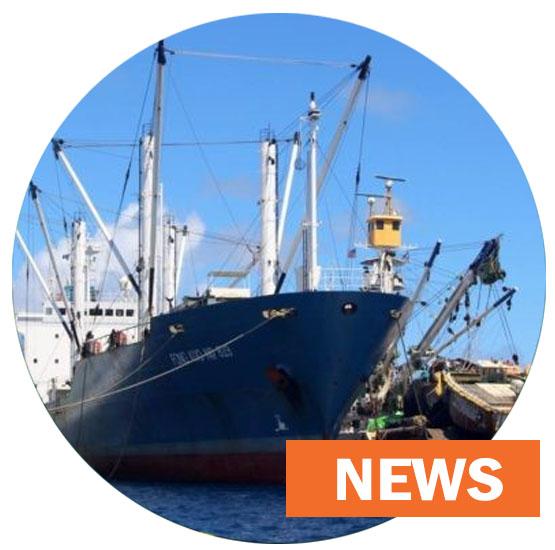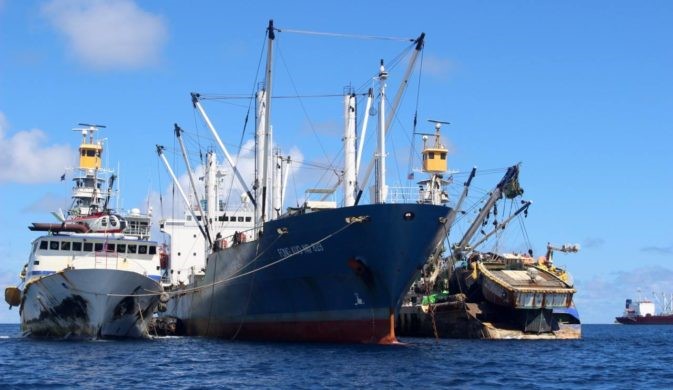

An association of powerful tuna firms in Papua New Guinea (PNG), which boasts some Asian giants as members, intends to obtain its own Marine Stewardship Council (MSC) certification and terminate a collaboration with Pacifical, an EU-based sales company which uses the marketing line "sustainable tuna straight from paradise".
PNG is better off going it alone on MSC and breaking away from the Parties to the Nauru Agreement (PNA) country group partnered with Pacifical, said Sylvester Pokajam, president and chairman of the Fishing Industry Association (FIA) of PNG, which represents tuna giants Fong Chun Formosa Fishery Company (FCF), Frabelle Corp, and RD Corp, as well as a joint venture which counts Thai Union Group as a partner.
Pacifical is "not transparent with its accounts and financial operations and reporting", Pokajam told Undercurrent News, when asked why PNG has decided to obtain its own MSC certification, as announced on Aug. 10. Henk Brus, managing director of Pacifical, and Maurice Brownjohn, commercial manager for the PNA, a group of tiny Pacific island nations that control the largest MSC tuna resource in the world, refuted these allegations, however. In a statement sent to Undercurrent, the PNA and Pacifical rejected the non-transparency claim, referring to it as "clearly mischievous and commercially motivated".
Biggest PNA player looks to go alone
Pacifical was set up in 2011 as a joint venture between PNG and the other PNA countries and Dutch firm Sustunable to promote MSC-certified "free school" skipjack and yellowfin tuna caught in the Pacific Ocean. At present, PNG tuna is MSC-certified together with the other PNA nations, which have a deal to sell all their eco-labeled tuna, from free school trips, via Pacifical. However, PNG tuna firms, whose canneries process more than 80% of tuna caught in the country's waters, are planning to stop contributing to Pacifical "as soon as possible", said Pokajam.
He declined to give a timeline on when this would be, however. PNG canneries "have their own marketing brand" and can qualify for MSC certification and "all benefit shall accrue to the PNG fishing and processing industry and its PNG people," said Pokajam. "We want PNG MSC [tuna] to be 100% PNG-owned." The eight PNA countries and Tokelau, another island, collectively control 25–30% of the world's tuna supply, and approximately 60% in the western and central Pacific. PNG is the largest in terms of canning capacity and catch, however. It has six tuna canneries, with a forecast production for 2019 of 125,000 metric tons. "More than 80%" of the PNA's processing is done in PNG, said Pokajam. PNG also catches about 25% of the PNA total and 12% of the global catch, he said.
The FIA-member canneries in PNG include the Majestic Seafood JV between Thai Union, the world's largest tuna canner, Philippines fishing and processing firm Frabelle and local partners; South Seas Tuna, a joint venture between Taiwanese trading giant FCF and Jaczon, part of Dutch group Cornelis Vroljik; Nambawan Seafood, a joint venture involving FCF and more Filipino investors; RD Tuna Canners, owned by the Philippines-based conglomerate RD Group; and International Food Corporation, part of Malaysian group Kumpulan Fima Berhad.
Pacifical promised "windfall revenue to PNA members, starting initially with 5% revenue sharing on a 50/50 basis", said Pokajam. This would mean Sustunable takes 2.5% and the eight PNA nations, and Tokelau, one-ninth each of 2.5%, Pokajam said. However, revenue has been less than promised, he said. Today, it has declined to a "mere 2%", so 1% for Sustunable, and one-ninth of 1% for the other nine countries, Pokajam said. Francisco Tiu Laurel Jr, of Frabelle, echoed Pokajam's comments.
"Many of us in the [PNG tuna] industry [have] lost faith in Pacifical. PNG has funded most of Pacifical and it is getting almost nothing, there is no transparency in Pacifical. They don't even have audited financial statements for every year of operations. The sharing scheme is flawed," Tiu Laurel told Undercurrent. "They even incorporated Pacifical in the Netherlands. For what? And to whose advantage?" Some of the FIA-member companies involved in PNG, such as FCF and RD, have agreements with Pacifical in place already.
In October last year, Pacifical announced an agreement with RD, under which it claimed MSC tuna from PNG would make its way into Europe. The signing with RD came after the PNA agreed to cut the service fee it charges from 5% to 2% -- as referenced above by Pokajam -- beginning on Jan. 1, 2018, it was said at the time. When asked for comment by Undercurrent, RD said it is in support of the move from the FIA, however. “We are fulfilling the MOU [memorandum of understanding] we made with Pacifical last year when there was no PNG origin MSC certified fish yet. RD Group is in full support of the NFA [National Fisheries Authority] and the FIA initiative and future endeavors to get MSC certification for PNG fishery," the group said.
FCF inked an MOU deal with Pacifical in 2015. Max Chou, CEO of FCF, declined to comment for this story, however. Cornelis Vroljik, which has a minority stake in South Seas, with FCF, referred Undercurrent for FCF to comment. The other member companies of the FIA did not respond to requests for comment. Asked for his point of view about PNG's aim to achieve its own certification and about the accusation of poor financial transparency, Brus replied to Undercurrent by email: "Do fact checking! This is not about views, but about facts". The "fact is that in the Netherlands all financial records are available with the CoC [chamber of commerce]". Undercurrent was unable to obtain any recent audited financial report for the company, as the Dutch CoC confirmed that no financial statements for the registered firm Pacifical had been filed by its management. "There is not one financial statement dropped for Pacifical. I cannot give you what has not been delivered," an employee at the CoC told Undercurrent